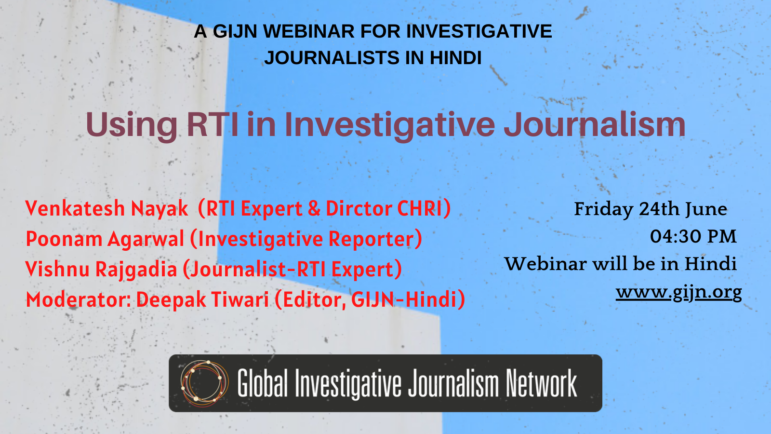

Myungju Lee, an investigative reporter from the Korea Center for Investigative Journalism (KCIJ-Newstapa), talks about FOIA requests at GIJC23. Image: Ellen Lindqvist Karsberg for GIJN
Tips for Better FOIA Requests: Taking Right-to-Information Access to the Next Level
Read this article in
Many reporters rely on Freedom of Information Act (FOIA) requests and Right to Information (RTI) legislation for their investigations. But how do you take these requests to the next level?
In a panel at the 13th Global Investigative Journalism Conference (GIJC23), journalists and experts from South Korea, Brazil, Sweden, and the United States shared strategies, advice, and tools for achieving better results with your FOIA requests, consulting public information archives, using artificial intelligence to reveal redacted information, and working on collaborative RTI investigations.
On the panel were Myungju Lee, an investigative reporter from the Korea Center for Investigative Journalism (KCIJ-Newstapa), Luiz Fernando Toledo, director of Data Fixers, a data and public records gathering project, Amanda Hickman, chief operating officer of the nonprofit collaborative MuckRock Foundation, and Mats Amnell, a veteran journalist from Sweden’s daily newspaper Sydsvenskan.
Collectively, they have used FOIA and RTI to uncover luxury spending by a former Brazilian president, to dig into obscure spending by South Korean prosecutors on fancy restaurant meals, and to structure their newsroom to delve into the daily documents produced by the police and local governments in search of stories.
Tips from the Pros
Contrary to the old adage, you can always teach an old dog new tricks, and whether you are new to the FOIA request process or have top-level experience, these recommendations could help you up your game.
- Don’t ask for 1,000 documents, ask for 10 (then ask for more in your follow-up request). Even if you think you might need many hundreds or even thousands of documents for your investigation, don’t ask for them all at once, because officials might look for a way to get out of a time-consuming task. The Swedish reporter Amnell suggests asking for a few documents first, and once you get those, asking for the larger bulk of them, so if you are denied the request you have a precedent.
- Don’t be discouraged by heavily redacted documents. Strive to find even the smallest clue within documents received. If you need to reveal redacted text in your FOIA, you might find this handy redactions tool, described below, useful.
- Actively collaborate with experts and specialized civic groups. FOIA replies may contain technical information best interpreted by experts in fields such as law or accounting, and specialized civic groups might have a history of digging into the issues you’re muckraking. Don’t underestimate the impact collaboration might have on your research. This was a suggestion given by journalists across the panel.
- Do not give up if your FOIA request is denied. Pursue it even if it means taking it to court. FOIA and RTI legislation allows citizens — and, as a result, journalists — to take to court those cases in which all or some information is denied, or when the requests are not answered at all. Amnell reminded journalists to use legal arguments, not moral ones, when this happens. A judge wants to see a judicial basis for the claim, not just a call for the respect of democracy, human rights, or transparency, he said.
- Share, share, share. Partner with local nonprofit independent newsrooms and larger news organizations to expand the scope of your investigation nationwide or even globally. Toledo shared the responses to thousands of his FOIA requests — which covered three years of public spending under the former Brazilian President Jair Bolsonaro, and revealed how the former president spent public money on ice cream and hotels — with partners from news organizations around the globe. “Sharing knowledge is the best way to avoid state secrecy,” said Toledo.
The ‘Muck-Rocker’ Toolbox For Better FOIA Requests
Technology has taken FOIA requests and RTI investigations to the next level and introduced ways to read requests other journalists have made, receive advice on how to build your FOIA request, and see redacted text in FOIA replies.
MuckRock, a US-based nonprofit organization, assists in filing FOIA requests in territories with US jurisdiction, but has expanded to offer a wide range of RTI-related services available for international users.
At the heart of the offering is the Public Records Requests service, where, for a small fee (US$4 and $2 for users with membership), MuckRock will file FOIA requests for you or let you browse their library for inspiration. Find out if another journalist already filed a similar request by looking through the site’s immense FOIA logs archive (58,819 FOIA requests to US federal, state, and local agencies and counting) and sample requests.
Among the other 40 tools offered by Muckrock, DocumentCloud allows you to organize, analyze, and host millions of primary-source documents contributed by newsrooms that have been verified by MuckRock. There are several other notable ones.
- Bad Redactions. The documents you receive from a FOIA request may be redacted, but the underlying text might still be intact. Try this add-on to reveal mis-redacted annotations, text that could be recovered, and possibly read through the redactions.
- oTranscribe. Facilitates the transcription process by allowing different playback speeds and features such as inserting timestamps. Although oTranscribe doesn’t give you an automatic audio to text conversion, the WhisperAI DocumentCloud add-on does give you access to this OpenAI-powered automatic transcription tool.
- Tabula Spreadsheet Extraction will turn any tables in your FOIA response PDF into a spreadsheet format.
And Don’t Forget GIJN’s Resources
GIJN has a Global Guide to FOIA and RTI, and the “FOIA This!” series developed by resource center senior advisor Toby McIntosh which covers Tips on Using FOI/RTI Laws Around the World, Digging Out Government Spending and Big Stories in Government Data.
Sending and receiving FOIA requests no longer needs to be an exchange between a journalist and a frustratingly evasive government official. By using these tips and tools reporters can upgrade RTI investigations and turn FOIA requests into a technology-enhanced and collaborative activity that feeds from the work of peers all around the world.
But remember, as Miraj Chowdry, GIJC23 panel moderator and GIJN Bangla Editor said: “You have to be genuine, you have to be persistent, and you have to be innovative.”
Watch the full GIJC23 panel on FOIA/RTI Investigations below.







